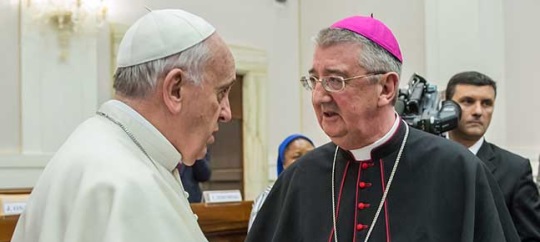The Archbishop of Dublin, Diarmuid Martin, has ordered training to begin immediately to prepare volunteers in parishes to support families in preparation for Baptism, Confession, First Communion and Confirmation.
The aim is to shift the archdiocese gradually away from school-reliant sacramental preparation – to tackle a range of issues associated with that – including especially the now-typical departure of teenagers from sacramental practice soon after Confirmation and the absence of many of their parents also.
The priests’ council of the archdiocese has passed the following resolutions:
“That the diocese implement an approach to the sacraments of Baptism, First Reconciliation, First Communion and Confirmation that pivots on supporting parents in sharing faith with their children.
“That the parish assumes responsibility for the preparation and celebration of all four of these sacraments.”
This shift toward developing parental and parish responsibility for sacramental preparation was foreshadowed for all Irish dioceses in the National Catechetical Directory launched by the Irish bishops in 2011 – ‘Share the Good News’. Archbishop Martin is known to be frustrated by the delay in implementing that ten-year programme. In April he was seriously critical of the Irish Bishops Conference over this – telling the Irish Times:
The Irish Times also reports that this pending shifting of responsibility onto parishes and parents followed wide consultation:
“About 1,800 people – parents, parishioners, clergy, schoolteachers and principals – responded to an online survey.”
To read the complete Dublin archdiocesan press release on this important shift, click here.


A few years ago I accompanied other committed lay Christians in meeting +Diarmuid. He and I exchanged ideas about sacramental preparation which now coincides with the proposal that, due to failure of the flowering of the fruits/gifts of the Confirmation Sacrament, we need as Christians to entrust lay qualified Christians with the responsibility of preparation of subjects for the Sacrament – which enables both the fruits and the gifts of Confirmation to be exercised as a normal feature of our Catholic/ Christian development.
This would be a normal sequence of Faith development within a Christian Community – but the sad reality is that we live in a minority Christian environment where only a small minority even within our Christian Community is spiritually aware of our need for transformation.
As I experience life in my parish the need of the large attendances is to fulfill their obligation (on pain of mortal sin – God help us) and to fulfil their attendance obligation. What an abject observation on our Catholic population – all designed (firstly by +McQuaid), and later by all subsequent hierarchical personnel to keep the populace subsevient, compliant and deferential .
This is contrary to Lumen Gentium 37 of the provisions of the Second Vatican Council. The Lord Jesus was particularly opposed to such attitudes and practice. When He walked, He focused on the deprived and socially deprived, and was crucified by the establishment of the Jewish Hierachy. Does power over subjects blind our present hierarchy to the lesson the Lord preached here?
” … only a small minority even within our Christian Community is spiritually aware of our need for transformation.”
I feel that you are pinpointing something of extraordinary importance here, Frank – something central to the early church but lost almost beyond recovery by an Irish Catholic Church now desperately trying to halt its slide into oblivion.
Even the phrase ‘faith formation’ should give us pause. In whose power is it to ‘form’ the mature Christian faith of anyone else? Answer: no one. A mature Christian faith can never be the product of anyone else’s course of instruction or arranged sequence of experiences – because all we know about deep conversion tells us that it arises out of ‘suffering’ – i.e. out of experiences that by definition are unpredictable, unarranged and unwanted – the very experiences that every parent will set out to protect their children FROM.
It was ADULT despondency and despair that led the seekers of the baptism of first, John, and later of the followers of Jesus – and that baptism was an ADULT experience of rescue from that ADULT sense of being lost.
So to propose that the same ‘faith’ can be reproduced via infant baptism, followed by any mere sequence of instruction, is simply nonsensical. We need to rethink EVERYTHING in light of this reality.